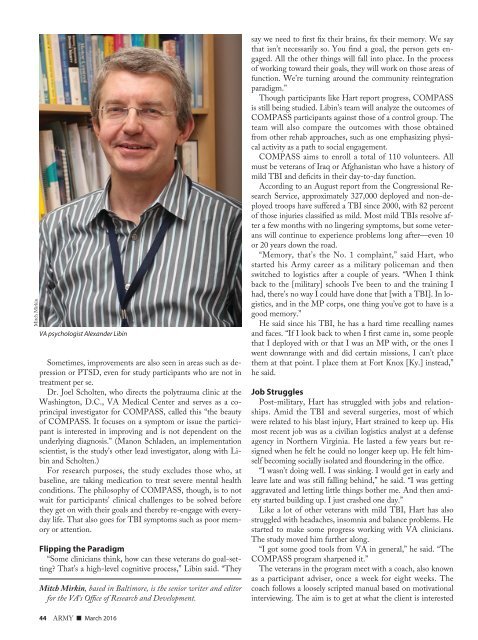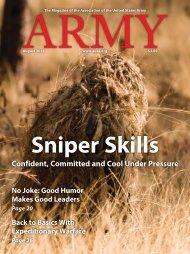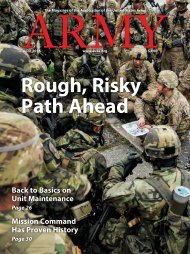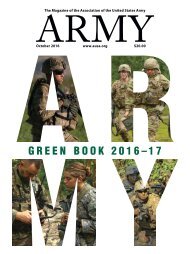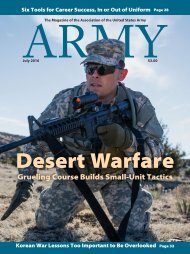Army - Stimulating Simulation
You also want an ePaper? Increase the reach of your titles
YUMPU automatically turns print PDFs into web optimized ePapers that Google loves.
Mitch Mirkin<br />
VA psychologist Alexander Libin<br />
Sometimes, improvements are also seen in areas such as depression<br />
or PTSD, even for study participants who are not in<br />
treatment per se.<br />
Dr. Joel Scholten, who directs the polytrauma clinic at the<br />
Washington, D.C., VA Medical Center and serves as a coprincipal<br />
investigator for COMPASS, called this “the beauty<br />
of COMPASS. It focuses on a symptom or issue the participant<br />
is interested in improving and is not dependent on the<br />
underlying diagnosis.” (Manon Schladen, an implementation<br />
scientist, is the study’s other lead investigator, along with Libin<br />
and Scholten.)<br />
For research purposes, the study excludes those who, at<br />
baseline, are taking medication to treat severe mental health<br />
conditions. The philosophy of COMPASS, though, is to not<br />
wait for participants’ clinical challenges to be solved before<br />
they get on with their goals and thereby re-engage with everyday<br />
life. That also goes for TBI symptoms such as poor memory<br />
or attention.<br />
Flipping the Paradigm<br />
“Some clinicians think, how can these veterans do goal-setting?<br />
That’s a high-level cognitive process,” Libin said. “They<br />
Mitch Mirkin, based in Baltimore, is the senior writer and editor<br />
for the VA’s Office of Research and Development.<br />
say we need to first fix their brains, fix their memory. We say<br />
that isn’t necessarily so. You find a goal, the person gets engaged.<br />
All the other things will fall into place. In the process<br />
of working toward their goals, they will work on those areas of<br />
function. We’re turning around the community reintegration<br />
paradigm.”<br />
Though participants like Hart report progress, COMPASS<br />
is still being studied. Libin’s team will analyze the outcomes of<br />
COMPASS participants against those of a control group. The<br />
team will also compare the outcomes with those obtained<br />
from other rehab approaches, such as one emphasizing physical<br />
activity as a path to social engagement.<br />
COMPASS aims to enroll a total of 110 volunteers. All<br />
must be veterans of Iraq or Afghanistan who have a history of<br />
mild TBI and deficits in their day-to-day function.<br />
According to an August report from the Congressional Research<br />
Service, approximately 327,000 deployed and non-deployed<br />
troops have suffered a TBI since 2000, with 82 percent<br />
of those injuries classified as mild. Most mild TBIs resolve after<br />
a few months with no lingering symptoms, but some veterans<br />
will continue to experience problems long after—even 10<br />
or 20 years down the road.<br />
“Memory, that’s the No. 1 complaint,” said Hart, who<br />
started his <strong>Army</strong> career as a military policeman and then<br />
switched to logistics after a couple of years. “When I think<br />
back to the [military] schools I’ve been to and the training I<br />
had, there’s no way I could have done that [with a TBI]. In logistics,<br />
and in the MP corps, one thing you’ve got to have is a<br />
good memory.”<br />
He said since his TBI, he has a hard time recalling names<br />
and faces. “If I look back to when I first came in, some people<br />
that I deployed with or that I was an MP with, or the ones I<br />
went downrange with and did certain missions, I can’t place<br />
them at that point. I place them at Fort Knox [Ky.] instead,”<br />
he said.<br />
Job Struggles<br />
Post-military, Hart has struggled with jobs and relationships.<br />
Amid the TBI and several surgeries, most of which<br />
were related to his blast injury, Hart strained to keep up. His<br />
most recent job was as a civilian logistics analyst at a defense<br />
agency in Northern Virginia. He lasted a few years but resigned<br />
when he felt he could no longer keep up. He felt himself<br />
becoming socially isolated and floundering in the office.<br />
“I wasn’t doing well. I was sinking. I would get in early and<br />
leave late and was still falling behind,” he said. “I was getting<br />
aggravated and letting little things bother me. And then anxiety<br />
started building up. I just crashed one day.”<br />
Like a lot of other veterans with mild TBI, Hart has also<br />
struggled with headaches, insomnia and balance problems. He<br />
started to make some progress working with VA clinicians.<br />
The study moved him further along.<br />
“I got some good tools from VA in general,” he said. “The<br />
COMPASS program sharpened it.”<br />
The veterans in the program meet with a coach, also known<br />
as a participant adviser, once a week for eight weeks. The<br />
coach follows a loosely scripted manual based on motivational<br />
interviewing. The aim is to get at what the client is interested<br />
44 ARMY ■ March 2016


